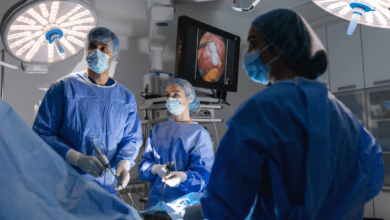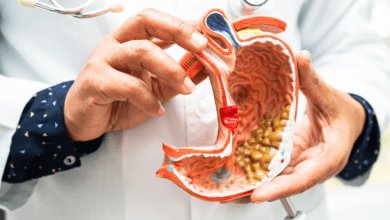What Are Hiatal Hernia Symptoms?

Hiatal hernia symptoms like heartburn, chest discomfort, or trouble swallowing can be more serious than they seem. You might be surprised to learn that these common issues could point to a hiatal hernia. But when do they become severe enough to require surgery?
In this guide, we’ll explain what a hiatal hernia is, how to recognize the symptoms, and what options are available for hernia repair, including hiatal hernia surgery.
What Is a Hiatal Hernia?
A hiatal hernia occurs when the upper part of your stomach pushes through the diaphragm into your chest cavity. Your diaphragm is a thin muscle that separates your chest from your abdomen and helps with breathing.
Normally, your stomach stays below the diaphragm. But when part of it pushes up through a weak spot or opening (called the hiatus), a hiatal hernia forms.
There are two main types:
- Sliding Hiatal Hernia: The most common type; the stomach and a section of the esophagus slide up into the chest.
- Paraesophageal Hernia: Less common but more serious; part of the stomach pushes through next to the esophagus and can get trapped.
Common Hiatal Hernia Symptoms
So, what are hiatal hernia symptoms that you should watch for? Some people with small hernias may not notice any symptoms. But larger hernias often cause:
- Heartburn or acid reflux
- Chest pain or discomfort
- Difficulty swallowing (dysphagia)
- Shortness of breath
- Feeling full quickly when eating
- Bloating or burping
- Regurgitation of food or liquids
Many of these symptoms are due to stomach acid backing up into the esophagus, especially when lying down or after eating. If you notice these signs frequently, it’s time to talk to a doctor.
When Do You Need Hernia Repair?
Mild cases of hiatal hernia can often be managed with lifestyle changes and medications. These may include:
- Eating smaller meals
- Avoiding spicy or acidic foods
- Not lying down after eating
- Losing weight if overweight
- Taking medications to reduce acid
But when these don’t help—or if the hernia causes severe symptoms or complications—hernia repair through hiatal hernia surgery may be necessary.
What Is Hiatal Hernia Surgery?
Hiatal hernia surgery is a procedure used to repair the opening in the diaphragm and return the stomach to its correct position. Surgeons may also tighten the opening and reinforce it to prevent the hernia from returning.
There are two main types of surgical approaches:
1. Laparoscopic Surgery
A minimally invasive method using small incisions and a camera. This option usually means a quicker recovery, less pain, and fewer complications.
2. Open Surgery
Used in more complex cases or if complications like a strangulated hernia are present. Recovery takes a bit longer, but the results are often long-lasting.
In many cases, a fundoplication procedure is also performed. This involves wrapping the top of the stomach around the lower esophagus to reduce acid reflux.
How to Prepare for Surgery
If your doctor recommends hiatal hernia surgery, they’ll guide you through pre-op testing and preparation. Common steps include:
- Imaging tests like endoscopy or barium swallow
- Stopping certain medications temporarily
- Fasting before surgery
- Arranging help at home during your recovery
Recovery can take a few weeks, and during this time, you’ll need to follow a soft diet and avoid heavy lifting. Most patients report a significant improvement in symptoms post-surgery.
Don’t Ignore the Symptoms
Knowing what are hiatal hernia symptoms can help you take action before things worsen. Left untreated, large hernias can lead to serious complications like ulcers, strangulation, or severe reflux that damages the esophagus.
The good news? Most people who get hernia repair or hiatal hernia surgery experience relief and go back to living a normal, active life.
Final Thoughts
A hiatal hernia may not be life-threatening, but it can definitely affect your comfort and health. Whether you’re just starting to notice symptoms or considering surgery, the key is early diagnosis and the right treatment plan.
Listen to your body, talk to your doctor, and don’t ignore recurring heartburn or chest discomfort. With the right care, you can breathe easier, eat comfortably, and feel like yourself again.





